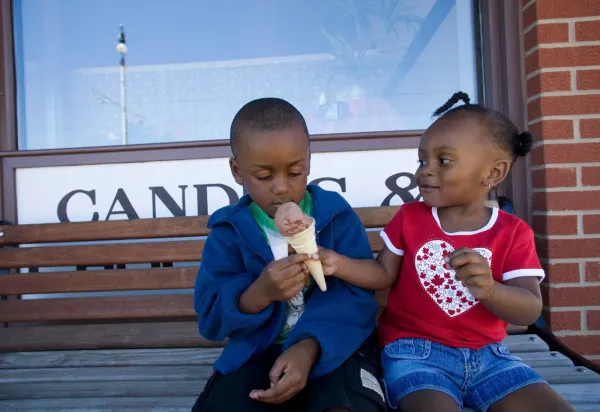As parents, we all know how crucial effective communication is in our children's lives. It's the key that unlocks doors to understanding, empathy, and strong relationships. But for our children, the journey toward becoming skilled communicators can be both exciting and, at times, challenging.
All three of my kids underwent some sort of speaking problem - mostly a rapid pace of communication that left my husband quite confused at dinner time. But over time, each of them slowly improved. My son, the fastest speaker, even started a podcast (which helped him become an even better speaker).
In this article, we'll explore the art of fostering effective communication in kids, especially teens and pre-teens. We'll begin by laying down some basic guidelines that emphasize empathy, the avoidance of punishment and anger, and the importance of preventing self-disappointment and shame. So, whether you're dealing with a kid who talks a mile a minute, one who's hesitant to utter a word, or another who constantly interrupts, we've got you covered with practical strategies to help your pre-teen become a confident and considerate communicator. Let's dive in and equip our kids with a lifelong skill that will serve them well in all their future endeavors.
Before We Get Started
There's a right way and a wrong way to help your kids improve their speaking.
DO: Have Empathy
Consider your own childhood for a moment. Were you always a confident and perfectly paced speaker at the age of 6, 7, or 8? Chances are, you, like most of us, had your moments of stumbling over words or speaking too fast. As parents, we now witness these trials and tribulations from the adult's perspective. While it can be frustrating when we can't quite understand our children or when they frequently interrupt, it's crucial to approach their growth with empathy. Remember, you turned out just fine, and they will too.
DON'T: Focus on Short-Term Solutions
Reacting in the heat of the moment, such as snapping at your child when they're speaking at lightning speed, may provide momentary relief from frustration. However, it's essential to recognize that this isn't a viable long-term solution. While it might temporarily correct their behavior, it can negatively impact your parent-child relationship and create an imbalance. Strive to exercise patience and seek more effective approaches.
DO: Reward Progress
On the flip side, rewarding your children for any improvements or growth is an effective way to motivate them to keep getting better. A simple treat like ice cream or a heartfelt compliment can release dopamine, signaling to their brains that speech improvement is a satisfying and rewarding endeavor.
DON'T: Shame or Punish
Shaming or punishing a child struggling with speech issues is one of the least constructive approaches. Even a seemingly innocent question like, "Why do you talk so fast?" can instill shame and disappointment in your children. Often, they may not be fully aware of their speech challenges, and questioning them only serves to erode their self-confidence. It's a quick way to suppress their self-esteem and hinder their progress.
The 4 Archetypes
Effective communication doesn't come in a one-size-fits-all package. Just like adults, children have unique communication styles and face different challenges. Here, we'll explore four common archetypes, based on your child's unique communication challenges. Keep your child in mind as you read through these.
The Kid Who Talks Too Fast
This is the child who seems to have an endless stream of words, speaking a mile a minute. They're so eager to share their thoughts that they often forget to pause and listen. While enthusiasm is great, rapid speech can make it challenging for others to follow and engage in a conversation.
The Kid Who's Afraid to Talk
On the other end of the spectrum is the child who's hesitant to utter a word. They may be shy or anxious, afraid of judgment, or unsure of how to express themselves. Encouraging these children to open up and share their thoughts can boost their self-confidence and help them overcome their fears.
The Kid Who Interrupts Others
This child has a habit of constantly interjecting in conversations. Whether driven by excitement or impatience, they struggle to wait their turn to speak. We'll explore techniques to teach patience, respect for others' voices, and active listening, helping them become more considerate communicators.
The Kid Who Avoids Eye Contact
Eye contact is a crucial non-verbal aspect of communication, but some children find it challenging to maintain it. This may stem from shyness, social anxiety, or other factors. We'll discuss how to encourage children to make comfortable and appropriate eye contact, as it plays a pivotal role in connecting with others and conveying sincerity.
...And How To Help Each Kind of Kid
The Kid Who Talks Too Fast:
- Practice Pausing: Encourage your child to take a breath before speaking. Ask them to count to three silently before responding in conversations. This simple technique can help them slow down their speech and gather their thoughts.
- Use Storytelling: Engage your child in storytelling activities, where they learn to express their thoughts in a structured manner. Help them create a beginning, middle, and end for their stories, teaching them the importance of pacing and clarity.
- Tongue Twisters: Engage your child in fun tongue twister exercises. Practicing tongue twisters helps them become more conscious of their speech and encourages them to enunciate words clearly.
B. The Kid Who's Afraid to Talk:
- Start with Simple Questions: Encourage your child to participate in discussions by asking them simple questions about their day or interests. Provide opportunities for them to share without pressure.
- Show Interest: When your child does speak, express genuine interest in what they have to say. This positive reinforcement motivates them to speak more confidently.
- Supportive Friends: Encourage your child to spend time with supportive friends who listen and encourage them to speak. Positive peer interactions can boost their confidence.
C. The Kid Who Interrupts Others:
- Teach the Hand-Raising Technique: Teach your child to raise their hand when they want to speak, just like in a classroom setting. This visual cue reminds them to wait their turn and shows respect for others.
- Practice Turn-Taking: Engage in activities that require taking turns, such as board games or storytelling. This helps your child learn the importance of patience and respecting others' speaking opportunities.
- Family Focus Jar: Place a jar or container on the table during family conversations. When someone interrupts, they contribute a small item (like a coin or a bean) to the jar. Make it a fun family activity, and when the jar is full, celebrate with a special family treat or outing.
D. The Kid Who Avoids Eye Contact:
- Start at Home: Begin by encouraging your child to make eye contact during family conversations. Explain that this is a safe space to practice and build confidence.
- Gradual Gaze: Instead of expecting immediate, prolonged eye contact, encourage your child to start with short and intermittent eye contact. For example, they can focus on maintaining eye contact for a few seconds at a time and then gradually extend the duration as they become more comfortable.
- Visual Anchors: Use visual aids or prompts during conversations. For instance, place a friendly picture or a soft toy next to the person your child is speaking to. Encourage your child to make eye contact with the visual anchor, which can provide a sense of comfort while they work on direct eye contact.
One effective tip that applies to all communication archetypes is to find creative ways for your kids to practice their speaking skills. One of my personal favorites is encouraging them to start a podcast. This versatile activity offers numerous benefits for children facing various communication challenges. For "The Kid Who Talks Too Fast," hosting a podcast can help them develop pacing and articulation skills, ensuring their words are clear and easy to follow. "The Kid Who's Afraid to Talk" can gain confidence by expressing themselves in a controlled and comfortable environment, gradually overcoming their fear of speaking. "The Kid Who Interrupts Others" can use podcasting to learn the art of taking turns and active listening, as they'll need to let their co-host or guests speak. Lastly, for "The Kid Who Avoids Eye Contact," podcasting allows them to focus on content rather than worrying about maintaining eye contact, helping them build their speaking skills without added anxiety.
In fact, my own son struggled with talking too fast, and starting a podcast was a game-changer for him, offering a fun and effective way to improve his communication skills. Plus, he got to meet tons of friends, mentors, and even his heroes!
Navigating the challenges of helping your child become a more effective communicator can indeed be a frustrating process. It may at times feel like a journey filled with ups and downs. However, it's important to remember that this is a long journey. While the road may be winding and sometimes challenging, with patience and perseverance, your child will make significant strides in their communication skills. Maintaining a calm and patient approach is key; it assures your child that they are supported and valued throughout their journey. So, even when the process gets tough, remember that it will be okay, and your child's growth as a communicator is worth every effort. The confidence and effectiveness they gain will serve them well in the future, making it all worthwhile.











Member discussion